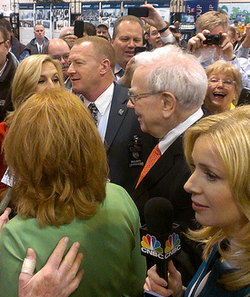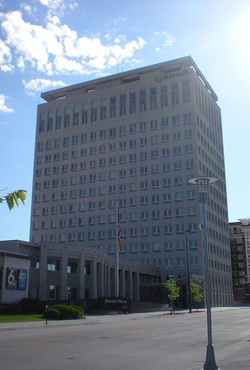It's Time to Break Up Buffett's Berkshire Hathaway: The Parts Are Worth More Than the Whole5/27/2014
The following article was first published here on the Motley Fool on April 30, 2014. Thornton Oglove is a Wall Street veteran known for his authorship of the institutional research publication, “The Quality of Earnings Report", and the seminal book, “Quality of Earnings: The Investor's Guide to How Much Money a Company Is Really Making.” His work features amongst the “must reads” by industry icons including Tom Gardner of the Motley Fool, and on Kuppy’s Book List as one of the top financial accounting books of all time. On May 3rd, Berkshire Hathaway (NYSE: BRK-A ) (NYSE: BRK-B ) will hold its 49th annual meeting at its headquarters in Omaha, Nebraska. Tens of thousands of its shareholders will converge on the city to pay homage to Warren Buffett, the company's Chairman and Chief Executive Officer. And if Buffett wants to make those shareholders particularly happy -- and much wealthier -- this year, he'll announce a plan to break up Berkshire Hathaway. The Oracle of Omaha At this time, Buffett is one of the world's most successful corporate executives ever. Between 1964 and 2013, Berkshire's book value has grown an incredible 693,518%. At the same time, a the S&P 500, with dividends included, returned 9,841%. With outperformance like that, no wonder Buffett's shareholders revere him. According to the October 27, 2003 edition of Barron's, there were four individual billionaire shareholders and many more shareholders whose Berkshire stock was worth over a million dollars. Since the publication of that article, the price of those shares has more than doubled. It's time for a change Berkshire doesn't pay a common-stock dividend, and every year at the annual meeting, there is a contingent of investors who ask whether it's finally time for that to change. Buffett's reply has remained constant: "Absolutely not." His stance is that the book value of the company today is considerably higher than it would have been if Berkshire had been paying dividends. While that stance may have been beneficial to Berkshire shareholders in the past, I don't believe it's true any longer. Berkshire has simply become too large to create sustainable market-beating returns for investors and much of the value of the company is hidden within its conglomerate structure. Here are five reasons why I think Warren Buffett should now become a distributor rather than an acquirer:  1. Unlocking hidden value If Warren Buffett announced a program of spinning off and distributing most of his operating companies to shareholders, Berkshire stock would soar in value. As Buffett has noted, the fair value of Berkshire is much higher than it's book value. Spinning off the conglomerate's many subsidiaries would bring this value into the light of day. 2. Tax advantages There are significant tax advantages for investors who receive corporate spin-offs. Specifically, when the spin-off is properly structured, the investor does not have to pay any taxes on the distribution until they sell their stock. 3. Dividend bonanza Most of the spun-off operating companies would be paying quarterly dividends, which would be a shareholder bonanza in itself. 4. Continued acquisition growth The liberated operating companies which are making "bolt-on" acquisitions would continue to make them. Last year, these subsidiaries contracted for 25 acquisitions. 5. Spin-offs leading to more spin-offs Berkshire lists 57 wholly and partially-owned subsidiaries on its website. If these were all spun off, some of them would, over time, be spinning off subsidiaries to their own shareholders.  What happens at HQ At the Berkshire headquarters in Omaha Nebraska, Buffett has a staff of only twenty-four, all of whom occupy offices on the same floor. And what do they do? To quote Buffett: ...the 24 men and women who work with me at our corporate office... efficiently deal with a multitude of SEC and other regulatory requirements, file a 23,000-page Federal Income tax return as well as state and foreign returns, respond to countless shareholders and media inquiries, gets out the annual report, prepares for the country's largest annual meeting, coordinates the Board's activities-and the list goes on and on. What does Warren Buffett, in consultation with his right-hand man Charlie Munger do? The answer is: Operating decisions for the various Berkshire businesses are made by managers of the business units. Investment decisions and all other capital allocation decisions are made for Berkshire and its subsidiaries by Warren E. Buffett in consultation with Charles T. Munger. Buffett has said that one of his criteria for acquiring a company is exceptionally high grade management already in place, because he can't supply it from headquarters. In this vein, Buffett has commented that he would hope, when he passes on, it will take an idiot to run any of Berkshire Hathaway's operating companies into the ground. Here's what Buffett had to say about managing Berkshire in the 2012 Berkshire annual report (emphasis added): I think it's appropriate that I conclude with a discussion of Berkshire's management, today and in the future. As our first owner-related principle tells you, Charlie and I are the managing partners of Berkshire. But we subcontract all of the heavy lifting in this business to the managers of our subsidiaries. In fact, we delegate almost to the point of abdication: Though Berkshire has about 330,000 employees, only 25 of these are at headquarters. Charlie and I mainly attend to capital allocation and the care and feeding of our key managers. Most of these managers are happiest when they are left alone to run their businesses, and that is customarily how we leave them. That puts them in charge of all operating decisions and of dispatching the excess cash they generate to headquarters. By sending it to us, they don't get diverted by the various enticements that would come their way were they responsible for deploying the cash their businesses throw off. Furthermore, Charlie and I are exposed to a much wider range of possibilities for investing these funds than any of our managers could find in his or her own industry. It is obvious to me, by using Warren Buffett's own verbiage, that most of Berkshire's operating companies would do very well on their own if they were spun off from the parent company. The building in Omaha housing Berkshire's HQ. Photo: Jon Clee Lack of trust? Yet I find it interesting that, at the age of 83, Buffett still micromanages his far-flung corporate empire when it comes to capital allocation. Apparently he does not trust the operating company managers to make their own major capital allocations. If we think about this realistically, there are so many corporate entities that Berkshire can distribute to shareholders that one would only have to worry about a very small minority of operating managers mis-allocating their capital and diluting their shareholder interest. What I believe would be more likely is that we'd see these great managers by and large making reasonable capital allocation decisions. That is, reinvesting in the business as appropriate and using excess capital to pay dividends or buy back shares. In closing The combination of Warren Buffett and Berkshire Hathaway is undoubtedly one of the most impressive business stories of our lifetime. And Buffett has created an incredible amount of value for his loyal shareholders over the years. But now is the time to show the investment world just how much value there is in Berkshire by breaking the conglomerate apart. I ask those who, like me, follow this stock, to head to the comments section below and reply with their thoughts for and against the breakup of Berkshire Hathaway. |
AuthorThornton Oglove is a well-known Wall Street veteran, the former publisher of The Quality of Earnings Report, and the author of the book "Quality of Earnings: The Investor's Guide to How Much Money A Company Is Really Making." He lives in San Francisco with his wife, Susan. Categories
All
|
 RSS Feed
RSS Feed
